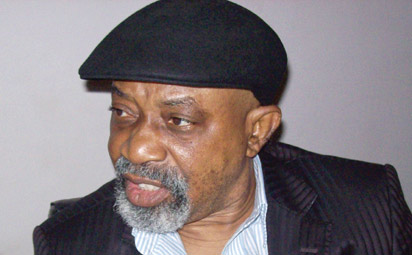
Chris Ngige, Nigeria’s Minister of Labour and Employment, caused quite a stir on Wednesday when he claimed the country has enough doctors to meet the medical demands of its huge population.
Appearing as a guest on Channels TV Sunrise Daily, Ngige said doctors were free to leave the country because the country has excess and can afford to share with other countries.
When asked if he was concerned about the increasing rate at which professional doctors leave Nigeria to practice outside the country, Ngige said: “I’m not worried, we have surplus (doctors), if we have a surplus, we export. I was taught Biology and Chemistry by Indian teachers in my secondary school days.
“They are surplus in their country. We have a surplus in the medical profession in our country. I can tell you this. It is my area, we have excess. We have enough, more than enough, quote me.
“There is nothing wrong, they go out to sharpen their skills, earn money and send them back home here. Yes, we have foreign exchange earnings from them, not from oil. Brain drain will only be inimical when for instance neurosurgeons travel and we don’t have neurosurgeons here.”

It is not the first time a member of President Muhammadu Buhari’s cabinet would be make such a claim. In September 2018, Professor Isaac Adewole, Miniter of Health, maintained that that the country has enough doctors.
“There is no serious shortage of doctors in Nigeria; people are free to disagree with me but I will tell you what the situation is across in Nigeria and many other African countries,” he had said.
“The data obtained from the Medical and Dental Council of Nigeria as of May 30, revealed that 88,692 doctors are registered in their books. Of these doctors, only 45,000 are currently practising and that gives us a ratio one doctor to 4,088 persons.”
The Reality
For one to become a doctor in Nigeria, one must have studied and graduated from Medical Science from an accredited university.
Not only that, such a person must have completed the compulsory one-year National Youth Service Corps, finished from Medical School, completed Residency training, obtain licensure as well as earning certificates in a speciality area.
Truly, so many people start the process but not all of them complete and become a certified doctor in Nigeria.
According to Medical and Dental Council of Nigeria, the country has 38 accredited medical schools spread across the country and they can only accommodate 3,350 while there are 103 teaching hospitals approved by the MDCN for internship training of individuals who are willing to become and practise as doctors in Nigeria.
An investigation shows that Nigeria has about 72,000 licensed and certified medical doctors. However, 35,000 of the figure are only practising in Nigeria.
A poll conducted by NOIPolls was in tune with the position of that investigation, showing that the country has 72,000 doctors — with only 35,000 practising within the country.
Most respondents in the poll cited high taxes & deductions from salary (98%), low work satisfaction (92%), and poor salaries & emoluments (91%) as challenges doctors face that make them consider moving abroad.
Majority of survey respondents (87%) also believed that the government is not genuinely concerned about mitigating the challenges facing medical doctors in Nigeria.

According to World Bank, Nigeria is a country with a population of approximately 197 million people. From the data above, it can be deduced that 197 million people have 35,000 doctors to treat them. This puts the ratio to one doctor to 5,628 people.
The Recommendation
According to data from the World Health Organization, over 45% of WHO Member States report to have less than one physician per 1,000 populations; Nigeria, as expected, is part of them.
WHO recommended that the appropriate ratio of people to doctor is 1:100.
Doctor Per Population In Africa

Ngige had argued that Nigeria fares better than most African countries in the ratio of doctor to population.
Below is a comparison of major African countries in relation to their ratio of doctors to population.
Ghana: 0.096 – 1,000
Nigeria: 0.395 – 1,000
Angola: 0.144 – 1,000
Morocco: 0.62 – 1,000
Egypt: 0.814 – 1,000
South Africa: 0.818 – 1,000
Algeria: 1.207 – 1,000
Verdict
Going with the above data, Nigeria clearly does not have enough doctors to match the country’s population.
And with the increasing population, Nigeria needs about 331,000 medical doctors to adequately meet the medical demands of every Nigerians.
This means that in addition to the 35,000 medical doctors available, the country needs to employ at least 10,605 new doctors annually to join the workforce.
According to NOIpolls, the Nigerian government must properly finance the health sector in order to create an enabling working environment and prevent brain drain to meet the doctor-patient ratio prescribed by the WHO.
END

Be the first to comment